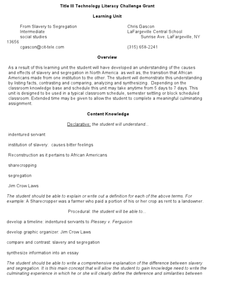Curated OER
The Slave Market: Slavery, Not Just a Southern Institution
Eleventh graders examine how slavery was related to the economic development of New York. For this American History lesson, 11th graders analyze the primary and secondary sources on the New York Slave Market. Students create a revised...
Curated OER
The Slave Market: Not Just a Southern Institution
Fourth graders analyze the existence of slavery in the North. In this slavery lesson, 4th graders research primary and secondary sources regarding Dutch colonial slavery in New York. Students consider how archeology made it possible to...
Curated OER
Abraham Lincoln's Position on the Question of Slavery and Its Extension
Students read excerpts from Abraham Lincoln's speeches and letters between 1854 and 1861 and look for information relative to Lincoln's thoughts on the legal and Constitutional aspects of slavery.
Curated OER
Slavery and the Legal Status of Free Blacks
Students examine the status of free blacks in Illinois and slavery in the U.S. They read and analyze primary source documents, answer and discuss questions, participate in a group discussion, and present the group's findings to the class.
Curated OER
Children and Slavery Document Search
Students review the causes of slavery, the Middle Passage, triangular trade and the spread of slavery throughout colonies. They work in small groups and search documents in order to find the answers to a question and document packet.
Smithsonian Institution
Of Human Bondage: George Washington and The Issue of Slavery
Learners read and interpret four documents George Washington wrote regarding his slaves. They analyze why George Washington was conflicted over the issue of slavery. They discuss the evolution of Washington's attitude toward slavery.
Curated OER
Timeline of Compromises over Slavery
In this primary source analysis worksheet, students read excerpts of the Preamble, the Constitution, and the Fugitive Slave Act, the Missouri Compromise, the Compromise of 1850, the Kansas-Nebraska Act, and the Crittenden Compromise....
Curated OER
Freedom and Dignity Project
Eleventh graders explore slavery and the civil war. In groups, 11th graders discuss and slavery and identify reasons for its beginning. In groups, they role-play a character for a talk show. Students determine what slavery was like in...
Curated OER
Presidents and the Constitution: Lincoln and the Emancipation Proclamation
Students consider the impact of Lincoln's Emancipation Proclamation In this U.S. Constitution lesson, students read a narrative regarding the move by Lincoln to officially end slavery. Students take notes on the case and respond to...
Curated OER
George Washington and Slavery: The 1799 Census of Slaves
Students discover details about the slave community at Mt. Vernon. In this George Washington lesson, students examine Washington's 1799 Slave Census in order to determine what life was like for slaves of the first president. An analysis...
Curated OER
Torn from Each Other's Arms
Learners consider how the institution of family suffered under slavery. In this slavery lesson, students watch segments of "Slavery and the Making of America". Learners examine the structure of the Driggus family and discuss how slavery...
Curated OER
How Connecticut Benefited from American Slavery
Eleventh graders explore Connecticut slavery. In this American slavery lesson, 11th graders analyze primary sources relating to slavery in the state as they research in collaborative groups. Students determine whether Connecticut should...
Curated OER
The Anti-Slavery Movement
Eleventh graders as a class create and write a constitution for an anti-slavery society. They investigate demographics of slavery, treatment of slaves, the colonization movement, and women in the abolition movement, and present their...
Curated OER
African American Experiences: Window to the Past
Students examine African life during slavery on the Internet. In this slavery lesson, students use the Internet to research slavery and create a scrapbook. Students review pictures of slavery and label them as primary or secondary sources.
Curated OER
Dark Voices From Unmarked Graves
Students read The Life of Olaudah Equiano or Gustavus Vassa. They view video from Roots by Alex Haley on the capture of Kunta Kinte and reenact household slavery as practiced by the Igbo people. The make a list of major differences...
Curated OER
Frederick Douglass: If There Is No Stuggle, There Is No Progress
Students explore Frederick Douglass's method of resisting slavery. In this Frederick Douglas lesson, students read a speech given by Douglas regarding his theories of resistance. Students discuss the speech and then write their own...
Curated OER
Africa, Africans, and Film
Students examine the impact the Atlantic Slave Trade had on Africa and the African people, through the analysis of literature and film. They identify the geographic regions of Africa and locate selected African countries, countries that...
Curated OER
Slave Culture during the Age of Jackson
Students consider slave culture during the time of Andrew Jackson. In this lesson on slavery, students watch a PowerPoint presentation, take notes, then analyze an extensive list of primary sources in order to understand what and how...
Library of Virginia
Antebellum Freedom
From indentured servitude to involuntary race-based servitude, slavery has taken many forms in American history. Class members examine three manumission petitions that reveal how the rights of African Americans and African American...
Library of Virginia
Life as an Enslaved People
As part of a study of slavery in the United States, class members analyze documents related to the sale of slaves. They consider not only the text of the bills of sale but also what the appearance of the broadsides suggest.
Gilder Lehrman Institute of American History
Harriet Beecher Stowe Sends Uncle Tom’s Cabin to Victoria and Albert, 1852
Harriet Beecher Stowe's plea for abolition is not only laid plain in her acclaimed novel, Uncle Tom's Cabin, but in her written correspondence as well. High schoolers read a letter written by Stowe to Prince Albert and Queen Victoria to...
Curated OER
Slavery and the Legal Status of Free Blacks: Rhetorical Analysis of Debates During the 1847 Illinois Constitutional Convention
Eleventh graders read actual arguments regarding the status of free blacks in Illinois and slavery in the United States more generally.
Curated OER
Attitudes About Slavery in Franklin County, Pennsylvania
High schoolers examine the historical attitudes towards slavery in Pennsylvania. They read transcriptions from two Pennsylvania newspapers and compare/contrast the county's Republican and Democratic Parties' positions on slavery.
Curated OER
From Slavery to Segregation
Students study the causes and effects of slavery and segregation. They write an essay (including either pictures, charts, graphs or copies of documents to support their essay) which addresses the African American's journey from slavery...

























